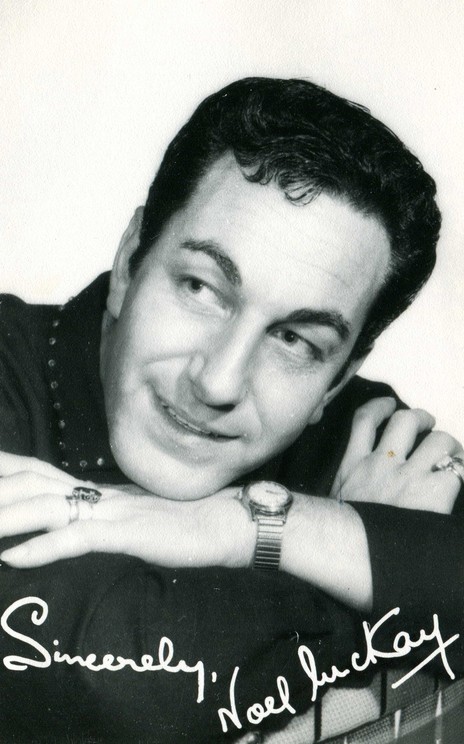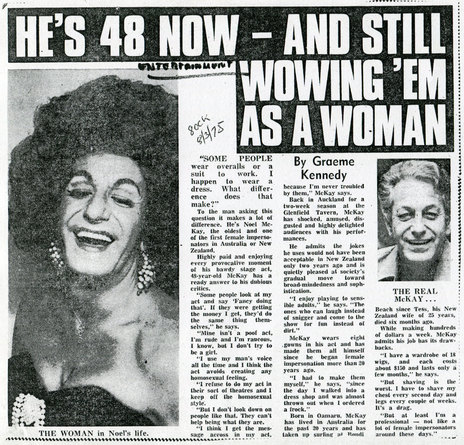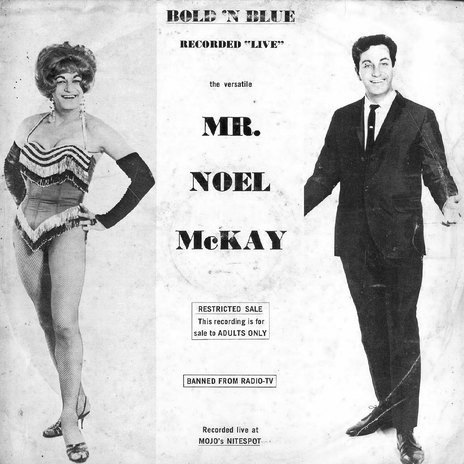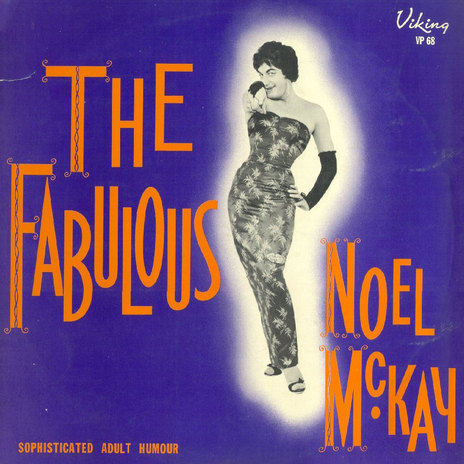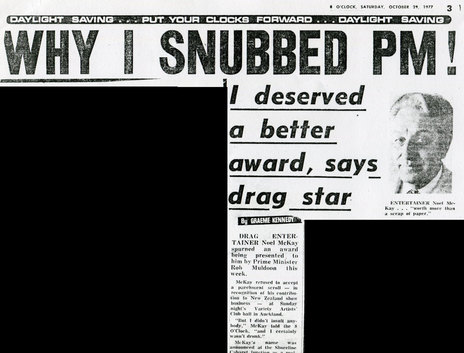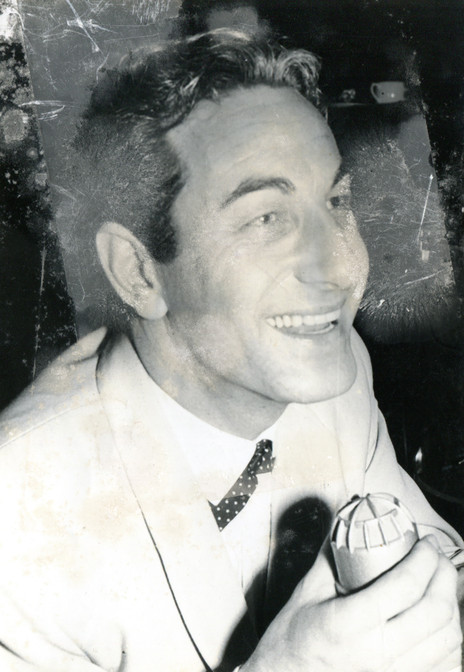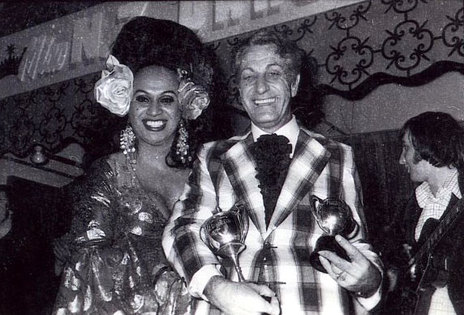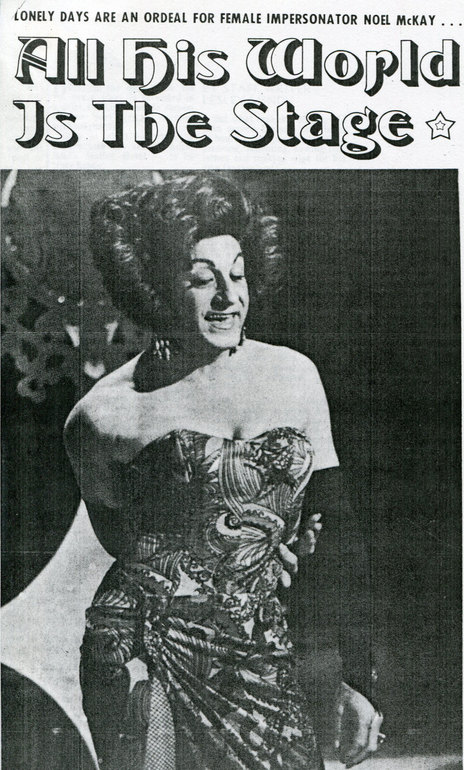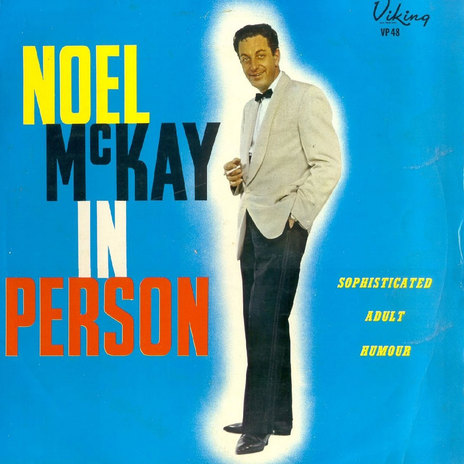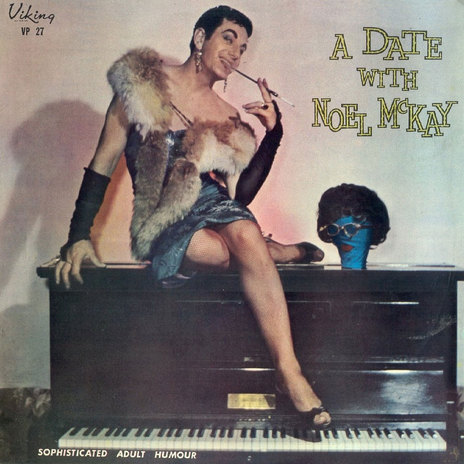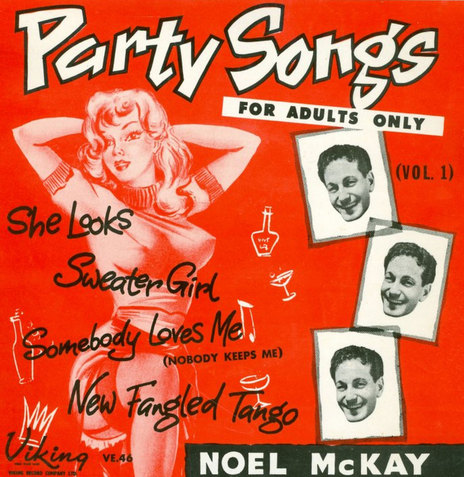When two “dancing girls” were sent down to McKay’s table – where he sat with his sister – he agreed to come up on stage, but only because he didn’t want to embarrass the dancers. Once in the spotlight, when Muldoon tried to present the scroll, McKay refused. He said, “I’ll shake your hand, sir, but I won’t accept the award.”
McKay’s stance was not political, but personal. He explained later to the 8 O’Clock newspaper, “All I said to him was, No thank you sir, I do not wish to accept it.”
His reason? “After 40 years in show business, both here and overseas, I felt I deserved more than a piece of paper. I’m not being big-headed about this – nor am I coveting anyone else’s award – but I believe a scrap of paper was a personal insult.”
The big annual award of the VAC is the Benny, named after magician Edgar Benyon, who died the year of McKay’s stance (when the Benny was awarded to the high-achieving Max Cryer). Other entertainers receiving scrolls in 1977 were broadcaster John Maybury, hard-living popular pianist Jack Thompson, and singer George Tumahai.
McKay was a professional entertainer for 33 years, and a courageous ground breaker.
All had paid their dues, but McKay was very conscious that he had not only been a professional entertainer for 33 years – starting as a 15-year-old “contortionist” – but a courageous ground breaker. Tall, with legs that looked good in stilettos, McKay was a singer/comedian who offered “sophisticated adult entertainment”. That nudge-nudge euphemism concealed the fact that McKay was a drag act, whose risqué songs and jokes were often a bluer shade of blue.
New Zealand at the time mainly offered pubs that closed at 6pm – ladies in the lounge bar, please – or, on a special Saturday night, a mixed grill followed by the pictures. So to be at Auckland clubs such as the Arabian, the Colony or the Montmartre circa 1960 and witness McKay’s innuendos over a chicken in a basket, a McWilliams sherry and maybe a coffee laced with cheap local whisky, was to be at the cutting edge.
It was also the end of an era. Soon, television would arrive as government-funded electronic Mogadon to keep people safely at home.
Born in Oamaru about 1928, McKay began working as a female impersonator in the early 1950s. In his heyday he wore 18 wigs and eight frocks a night during his act, making all the dresses himself after learning to sew in a clothing factory (he was quickly sacked for sewing up the wrong seams).
“People say I make easy money, but I do suffer for it,” he said, regretting that thanks to his shaved legs, chest and armpit, he could never wear short-sleeved shirts and walk-shorts during summer.
McKay was occasionally “accused of being gay”, wrote the Otago Daily Times in 1978. “He vehemently denies this, however, and holds up a 25-year long happy marriage with his late wife for proof.” He doubted that any “camp” people attended his shows, though he had nothing against them. “I don’t give a damn what they do or are. That’s their business.”
By the 1970s, McKay was pleased to see that society had become more open-minded towards his sophisticated entertainment. “I enjoy playing to sensible adults,” he told the 8 O’Clock in 1975. “The ones who can laugh instead of snigger and come to the show for fun instead of dirt.” Then aged 48, he was based at Bondi Beach, Sydney, and had just taken up surfing after his much-older wife Tess had recently died. He was back for a two-week season at the Glenfield Tavern, and would soon have residencies at the Station Hotel in Auckland, and Phil Warren’s Silver Spade cabaret in Napier.
McKay performed in Japan, Britain, Europe and the United States, but all of his many recordings were made in New Zealand. In the early 1960s there were six albums, A Date with Noel McKay, Noel McKay In Person, That’s Me All Over, Noel McKay’s Party Song Book, The Fabulous Noel McKay plus the 1967 live album Bold ‘n’ Blue; all but the last were on Viking, who also released a series of five EPs called Party Songs for Adults Only. Among the tracks were ‘Johnny’s Little Yo-yo’, ‘My Body’s More Important than My Mind’, ‘Sweater Girl’ and ‘Leave My Instrument Alone’.
As the organ player, the legendary Claude Papesch came in for a lot of stick from McKay’s quips.
While the jokes may have dated – McKay never believed in a double entendre that couldn’t be improved by being single – the records are notable for just how risky the risqué material was for the time. Also, for the top jazz musicians he often used in his bands, among them bassist Bob Ofsoski, drummer Don Branch and guitarist Ray Gunter – virtually the best available in Auckland circa 1960.
As the organ player, the legendary Claude Papesch came in for a lot of stick from McKay’s quips. McKay could emulate a coy Noël Coward, singing to a delicate parlour piano backing. Then, with a quick costume change, become a brassy bluesman responding with saucy delight to Papesch’s organ. At the climax of ‘Leave My Instrument Alone’ (aka ‘You Played on My Piano’) he wails:
Well, I’m gonna let you play my fiddle/ you don’t want to stop
You keep on fiddling with it/ I’m gonna blow my top …
I let you play my trumpet/ But then you went too far
When I wasn’t looking/ you strummed on my guitar …
Carmen, the pioneering transvestite and club owner of Wellington, wrote a tribute to McKay at the Queen Music Heritage website. She remembered coming across McKay first in the 1950s, when as a gay male nurse she went to live in Auckland. McKay was working at the Hugh Wright’s menswear store on Queen Street:
"He dressed very elegantly in men’s suits only during daytime. He had a class drag act and sang on the stage for an hour at a time. His female costumes were very classy & he loved fancy black underwear & high heels & feather boas … He was a loner & only mixed with elegant classy friends. He sang a mix of songs often sitting on a stool or at the piano which he played. One of his songs I do remember was ‘My Body is More Important than My Mind’.
"In the 1970s we judged a drag fashion parade together held at the Peter Pan Cabaret [in Auckland]. The last time I can remember seeing him was in Kings Cross, Sydney, Australia at a friend’s 40th birthday still dressed very stylishly … He would be in his 80s now. Noel did marry; maybe twice even to women. There have been newspaper clippings in NZ about him. He did have some gender reassignment surgery; that I do know. Back in those days all of us were considered GAY and grouped together."
In 1978, when McKay was still about 48 – his age remains static in newspaper articles – he told the Otago Daily Times, “As long as the people keep laughing, I’ll keep performin’. As long as they enjoy me, I don’t care if they call me a five-dollar moll. On second thoughts, make that 10. I hate to work cheap.”
McKay died in Queensland in the 2010s; the actual date is yet to be confirmed.
